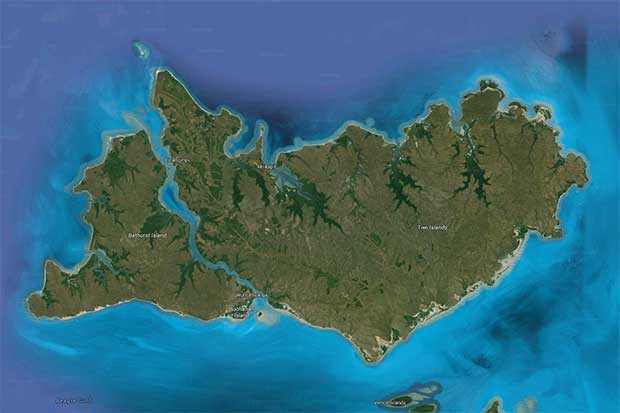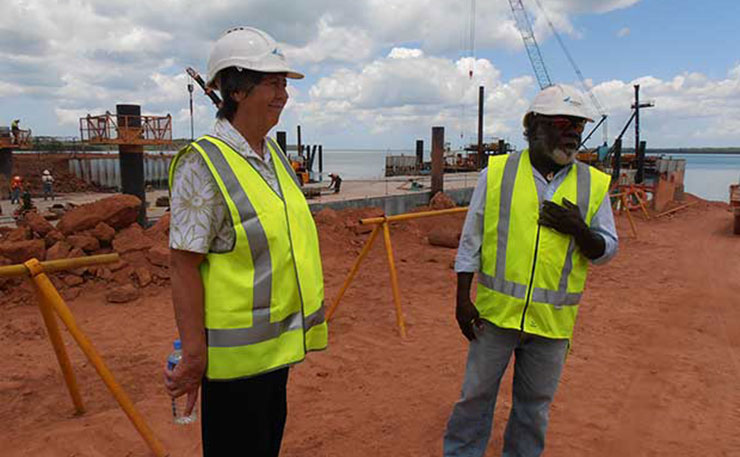The Tiwi Land Council’s involvement in the mysterious expansion of a $130 million sea port on Melville Island appears to have put its own decade-old plan to create a forestry industry on the island in serious jeopardy.
Fresh documents obtained by New Matilda under Freedom of Information legislation reveal that the Chairman of the Tiwi Land Council wrote a pleading letter to the Minister for the Environment, Greg Hunt, just days after the ABC revealed an existing forestry wharf on Melville Island had been expanded into an offshore oil and gas supply hub without any environmental approvals.
A wharf designed to load woodchips for export from the Tiwi’s fledgling forestry industry had existed on the site since 2003, but by May this year it had been expanded to include a 30-million litre diesel storage facility and 150-person accommodation camp for workers in the oil and gas fields based in the Timor Sea.
The area around Port Melville is home to 38 threatened and protected species, including turtles, dugong, Blue whales and dolphins. If the port is allowed to proceed, ships up to 200-metres will make daily stops at Melville.
Chairman of the Tiwi Land Council (TLC), Gibson Farmer Illortaminni wrote to Greg Hunt on May 8 – three days after the ABC broke the story – revealing that the Commonwealth Bank (CBA) had suspended a $6.1 million loan to the Tiwi because the federal government is investigating concerns the land council may have provided “false and misleading information” to Commonwealth investigators about the construction of the port.
“Yesterday, I was advised that the CBA approval is now suspended while the bank waits for a satisfactory outcome from your investigations of our port,” Illortaminni writes.
“Our forestry people are preparing a submission to the bank to attempt to convince them to change their position…. But if we fail, then our Tiwi Forestry Project will be lost….”
That project – which the Tiwi have been pursuing for more than a decade – is supposed to provide plantation timber for export to Asia, and provide jobs for up to 300 locals.
The CBA late yesterday refused to disclose whether or not the funds were subsequently released.
However further documentation obtained by New Matilda reveals that the Department of Environment wrote to the general manager of the Tiwi forestry project, Roger Smith, a week later, seeking to assure the Tiwi that, despite the ongoing investigation, the port could still be used to load the timber harvests.
“Thank you for your email of 15 May 2015, providing information about a proposed woodchip depot for the receival, storage and export of woodchips from Port Melville on Melville Island,” writes Trish Randell, Acting Director of the Environmental Protection and Biodiversity Conservation Compliance Section.
“I formally advise that no action will be taken by this department [and]… those works may proceed without need to obtain further approvals.”
The latest documents were contained in a second tranche of information released by the federal Department of Environment, following a series of Freedom of Information requests by New Matilda, some of which are still being processed.
The Tiwi Land Council yesterday declined to comment on the matter, but in the letter Chairman Illortaminni lays bare his deep concerns at the affect the ongoing federal investigation might have on their project.
“I write to tell you of my extreme distress at the most recent news I have received about our Tiwi forestry project,” he writes.
“Generations of Tiwi have worked tirelessly to build a successful forestry industry on the Tiwi Islands. In 2009 this became a challenging reality when we took over the plantation following the collapse of [Great Southern Plantations, the company which had been developing the 30,000 hectares under plantation].
“Our forestry people have been successful in negotiating a commercial loan for $6.1 million from Commonwealth Bank Australia to purchase the remaining equipment that we need and to construct a woodchip storage depot at our port, Port Melville, for the export of Tiwi woodchip.
“Your colleague, Minister Nigel Scullion, the Minister for Indigenous Affairs, authorized a… grant for the first tranche of equipment for $4.5 million. His department approved the use of this equipment as collateral for the CBA loan.
“We placed a deposit on the equipment to be purchased by Tiwi and funded by CBA. As all of this equipment is starting to arrive and as we need to build the woodchip storage depot in time to harvest and export the first shipment in July this year, we were negotiating with our finance brokers the first drawdown of $3.8 million next week.”
New Matilda understands that no woodchips have yet sailed from Port Melville. That’s very much in keeping with delays and problems that have plagued the project from its inception.
The financial viability of the forestry project has also been questioned. After Great Southern Plantations collapsed in 2009, receivers McGrathNicol issued a circular to investors which reported, “Tiwi Island operations are commercially unviable”.
“The operating costs and capital expenditure requirements are extremely high.”

The Tiwi Land Council subsequently took over ownership of the project, at no cost to itself.
In the years that followed the Australian woodchip industry would become increasingly volatile, and the wisdom of choosing it as the product which would underpin the Islanders’ aspirations for the development of a major local industry has since been the subject of sustained cynicism.
In addition to this, Great Southern was stung with fines of more than $4 million for breaches of the Commonwealth Environment Protection and Biodiversity Conservation Act, ironically the same legislation under which the Tiwi Land Council and its partners are now being investigated.
Despite the problems, Illortaminni’s letter to Environment Minister Greg Hunt outlines the community’s great expectations, and the vast expenditure already pumped into the project.
“Our plantations are on our forestry balance sheet at $47.5 million [but]without an operating port, they are worthless,” Illortaminni writes.
“Tiwi have contributed $16 million to the upkeep of plantations, including $3.5 million of family money in coming to harvest.”
But Illortaminni’s letter also reveals the Tiwi Land Council “are still unable to obtain commercial finance for operational funding”.
“If we cannot get the first drawdown of $3.8 million from the CBA loan this week and receive payment for the first woodchip shipment in July our project will collapse,” Illortaminni said.
It remains unclear if the TLC has received payment for its first shipment, which New Matilda understands has not left the port.
In addition to their role in developing the port, Illortaminni reveals that the Singaporean companies bound up in the expanded port development “are also carrying a substantial debt for [the Tiwi Land Council]which we cannot pay until we get woodchip revenue”.
The Tiwi Land Council argues the forestry project will create 100 local jobs, a figure which appears to include a promised 65 associated specifically with the operation of Port Melville. This falls well short of the much vaunted – and long-promoted – number of forestry jobs of 300.
The TLC reports it will also receive $1.50 for each tonne of shipping using the expanded port, plus 5 per cent of its gross revenue.
New Matilda’s investigation into this issue is ongoing.
Donate To New Matilda
New Matilda is a small, independent media outlet. We survive through reader contributions, and never losing a lawsuit. If you got something from this article, giving something back helps us to continue speaking truth to power. Every little bit counts.




